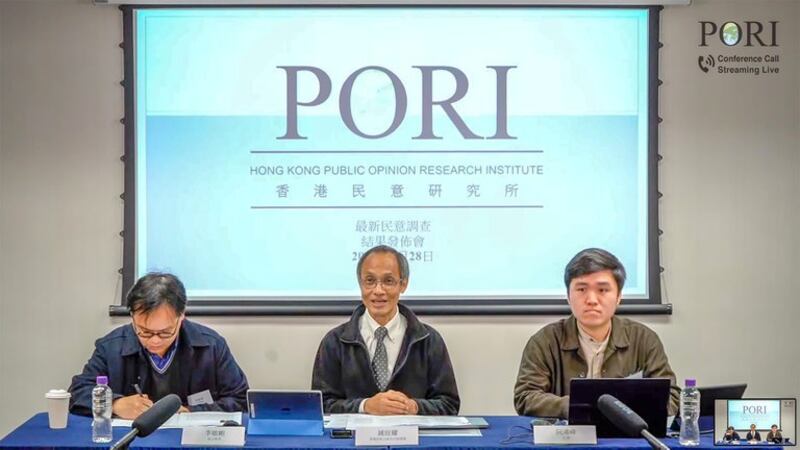Updated on Feb. 29, 2024 at 5:40 a.m. ET
Public trust of Hong Kong citizens towards the government has dived further on the back of the city’s aggressive campaign to legislate its own security laws.
The Hong Kong people’s trust of their government fell by more than 10% from the previous month, according to findings by the Hong Kong Public Opinion Research Institute, PORI, a sign that the negative impact of the Article 23 legislation will hang over the future of the city amid China’s intensified encroachment.
The public’s trust dropped from January’s 46% to 39% this month, while distrust of the government rose from 38% to 42%. The combined net decline of the two gauges is 11 percentage points, the online survey of 722 respondents released on Wednesday showed.
Furthermore, the public’s confidence of Hong Kong’s future recorded a decrease of 16 percentage points.
Political scholar Chris Li pointed out that such sentiments arose as the public is inundated with news in the past month of Article 23’s consultation, an issue which is also most related to their government and their future. A one-month public consultation for Article 23 legislation ended on Wednesday.
Under Article 23 of the Basic Law – Hong Kong’s mini constitution – the city has to enact its own laws to prohibit acts of treason, secession, sedition and subversion against Beijing. But such a move has been controversial. A previous attempt in 2003 failed following mass protests and was shelved until Beijing’s imposition of the National Security Law, or NSL, in 2020.
Last month, Hong Kong Chief Executive John Lee vowed to complete legislation of Article 23 this year, reiterating its priority on public discontent as well as economic and social issues.
Li said while the index on the rule of law recorded 5.24 points, a pass level, indicating that citizens felt that the judicial system and judges’ handling of cases were fair, their responses towards the legislative process were contrary.
“Looking at their responses, their concerns about legislating Article 23 are not about how the judiciary will implement it, but whether the legal provisions in the government’s draft legislation will affect Hong Kong’s more important values. Freedom of speech, freedom of assembly and association, the freedom to cooperate with many different foreign institutions and the freedom to cooperate with the international community, these are all relevant.”
“Maliciously smearing”
The NSL's implementation has triggered outflows of foreign and domestic capital and talent in the last three years. Hundreds of protestors, activists and former opposition lawmakers have been arrested since it came into force. And moving forward with legislation of Article 23 has inevitably met with international criticism and more backlash, albeit to no avail.
The Hong Kong office of China’s foreign ministry on Thursday lashed out at the British foreign secretary David Cameron and United States Department of State spokesman Mattthew Miller for “maliciously smearing and attacking Hong Kong's human rights, freedoms, and rule of law.”
The U.S. and the U.K. have raised concerns that Article 23’s legislation infringes the rights of the Hong Kong people and their citizens in the city.
In its statement, the Chinese foreign ministry said early completion of the legislation will enhance the stability of Hong Kong society and the certainty of the rule of law. It does not affect Hong Kong's “high degree of autonomy” and “rights and freedoms”, but “only targets a very small number of people who endanger national security.”
Hong Kong's Security Bureau on Thursday said 98.6% of the 13,147 submissions received during the public consultation showed support for the law’s enactment.

Cutting off Hong Kong’s edge
Still, PORI Chief Executive Robert Chung warned that when people fear their freedoms are compromised and it becomes an issue standing in the way of international cooperation, it will be tantamount to cutting off international relations, which will be detrimental to Hong Kong.
“If we do this, it will be very difficult to achieve ‘governance and prosperity,’ even close to impossible. Hong Kong’s advantage has always been to converge the East and the West in a civilized manner; Hong Kong must have this space.”
He pointed out that the authorities will establish more internal standards and management systems to avoid breaching the red line going forward, and clarity with the new regulations will take time for the judicial system and the courts to adjust.
“Only then can the citizens understand. In other words, the gray time or zone will exist for a certain period of time,” he added.
The Legislative Council’s “Basic Law Subcommittee” held its first meeting on Tuesday where Secretary for Justice Paul Lam stated that there is a societal consensus to complete the legislation as soon as possible.
Lawmaker Tik Chi-yuen raised the question as to whether Taiwan will be considered an “external force” under the Article 23 legislation.
Translated with additional reporting by RFA Staff. Edited by Taejun Kang and Mike Firn.
Updated to add Chinese foreign ministry comments and public consultation response under "maliciously smearing".
